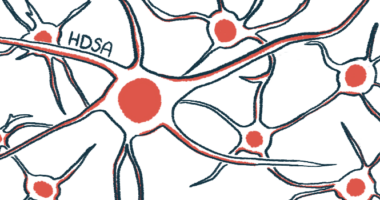Experimental treatments for Huntington's disease
AMT-130
AMT-130 is a gene therapy being developed by uniQure to slow the progression of Huntington’s disease. Administered directly into the brain, the therapy is currently being tested in people with early Huntington’s in two Phase 1/2 clinical trials.
ANX005
ANX005 is a therapy being developed to slow disease progression in early-stage Huntington’s. The therapy is given directly into the bloodstream. In a Phase 2a clinical trial, ANX005 was associated with significantly greater clinical improvements in a subgroup of patients. There are plans for a future Phase 2b/3 trial.
Deep brain stimulation
Deep brain stimulation is a treatment for certain neurological conditions that is also being investigated for Huntington’s. It involves the surgical implantation of an electrode in the brain Wires passing through the neck connect the electrode to a stimulator in the chest. The stimulator is a small device that delivers a controlled electronic pulse to the brain. The approach is being tested in a trial for the treatment of chorea in Huntington’s patients.
Dextromethorphan/quinidine
Dextromethorphan/quinidine is an oral therapy that has been investigated to ease irritability in people with Huntington’s. A small Phase 3 trial missed its main goal, but there was a strong placebo effect. The therapy’s future clinical development is currently unclear.
Pepinemab
Pepinemab, also known as VX15/2503, is an infusion therapy being developed by Vaccinex to slow Huntington’s progression. The therapy was tested in a Phase 2 clinical trial that failed to meet its main efficacy goals, but promising trends were observed in a certain group of patients. Advancement to Phase 3 testing is being considered
Pridopidine
Pridopidine, previously known as ACR16 and Huntexil, is an experimental oral therapy being developed by Prilenia Therapeutics to slow the progression of Huntington’s. The therapy was tested in a Phase 3 clinical trial that failed to meet its main goal, but promising trends were observed in certain subgroups of patients.
PTC518
PTC518 is a once-daily oral therapy being developed to slow Huntington’s disease progression. Interim data from a Phase 2a clinical trial showed that PTC518 was associated with trends of slowed disease progression relative to a placebo. There are plans for a future Phase 3 trial.
Resveratrol
Resveratrol is a natural compound with antioxidant and neuroprotective properties that has been evaluated in a single clinical trial as a potential oral treatment to slow progression of Huntington’s disease. Trial results have not been reported to date.
SKY-0515
SKY-0515 is an oral therapy being developed to slow or halt Huntington’s progression. It is being tested in a Phase 2/3 clinical trial after showing favorable safety and confirmed reduction of a disease-driving protein in a Phase 1 trial.
SOM3355
SOM3355 (bevantolol hydrochloride) is an experimental oral therapy being developed by SOM Biotech for Huntington’s-related chorea. After showing promise in a proof-of-concept Phase 2a trial, the therapy is being tested in Huntington’s patients within a Phase 2b trial.
Tominersen
Tominersen, previously IONIS-HTTRx and RG6042, is an experimental injectable treatment being developed by Roche to slow or prevent the progression of Huntington’s disease. The therapy is being tested in a Phase 2 trial in people with prodromal Huntington’s or at an early stage of the disease.
Triheptanoin
Triheptanoin is a lab-made fatty molecule being developed as a potential oral treatment to slow the progression of early-stage Huntington’s disease. A Phase 2 trial failed to meet its main goal, but there were some promising signs suggesting that triheptanoin may help stabilize disease and slow brain shrinkage.
WVE-003
WVE-003 is an experimental injectable therapy being developed by Wave Life Sciences to slow the progression of Huntington’s disease. Administered directly into the spinal canal, the therapy has completed Phase 1a/2b clinical testing in people with early disease carrying a specific mutation in the HTT gene.






